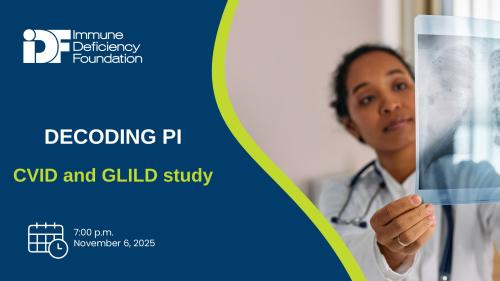
-
Understanding primary immunodeficiency (PI)

Understanding PI
The more you understand about primary immunodeficiency (PI), the better you can live with the disease or support others in your life with PI. Learn more about PI, including the various diagnoses and treatment options.
-
Living with PI
-
Addressing mental health
-
Explaining your diagnosis
- General care
- Get support
- For parents and guardians
-
Managing workplace issues
- Navigating insurance
-
Traveling safely

Living with PI
Living with primary immunodeficiency (PI) can be challenging, but you’re not alone—many people with PI lead full and active lives. With the right support and resources, you can, too.
-
Addressing mental health
-
Get involved

Get involved
Be a hero for those with PI. Change lives by promoting primary immunodeficiency (PI) awareness and taking action in your community through advocacy, donating, volunteering, or fundraising.
-
Advancing research and clinical care
-
Research Grant Program
-
Consulting immunologist
-
Diagnosing PI
-
Getting prior authorization
-
Clinician education
-
Survey research
-
Participating in clinical trials

Advancing research and clinical care
Whether you’re a clinician, researcher, or an individual with primary immunodeficiency (PI), IDF has resources to help you advance the field. Get details on surveys, grants, and clinical trials.
-
Research Grant Program
Since 2016, IDF has awarded more than $650,000 in competitive seed grants to fund patient-centered research on primary immunodeficiency. This year’s grant recipients are studying a diverse set of topics:
- The interplay between the gut microbiome (the collection of microorganisms that live in the human digestive tract) and inflammation in common variable immunodeficiency (CVID).
- Better measurement of immune dysregulation in patients with PI.
- The activity of immune system genes in patients with PI that don’t have a genetic diagnosis.
- The maternal and fetal factors that distinguish infants with temporarily low T cell numbers from those with persistently low T cell counts.

LaBere, Dr. Beth Thielen, and Dr. Artemio Jongco.
As the applicant with the highest-ranking grant, Dr. Joud Hajjar, an assistant professor at the Baylor College of Medicine, has been awarded the inaugural IDF Michael Blaese Research Grant Award in honor of IDF’s long-time medical advisor, Dr. Michael Blaese.
Hajjar’s research focuses on the roughly 60% of people with common variable immunodeficiency (CVID) who develop non-infectious complications (NIC) — that is, autoimmune and inflammatory disorders like inflammatory bowel disease or chronic lung disease. She suspects that these patients’ immune systems are locked in a damaging spiral with their gut microbiomes.
Previous work has shown that individuals with CVID that have NIC have an imbalance in their gut microbes, even if their complications are in other parts of the body. Their gut microbiomes have less bacterial diversity than healthy controls or CVID patients that only have infectious symptoms. They also have increased numbers of microbes known as pathobionts, organisms that are usually harmless but can cause damage under certain conditions — including when they are overrepresented in the microbiome.
Said Hajjar of the origins of her grant proposal, “This particular research really came from the clinic…you know, your patients come in with really pointed questions…when you don’t find all the answers in the literature, you’re kind of like, somebody needs to try to answer those questions.”
Hajjar started her work in mice and will use the IDF grant funds to extend her findings to patients with CVID. In mice, she demonstrated that transferring gut microbes from CVID patients with NIC affects the pattern of immunoglobulins the mice produce, suggesting an inflammatory response to the microbes. Interestingly, when these mice received IgG from healthy humans, mimicking IgG replacement therapy, the makeup of their gut microbiome changed. These results point to a two-way relationship between the makeup of the gut microbiome and the IgG (and perhaps, other immune responses) produced by the host.
In people, Hajjar hopes to characterize the NIC CVID gut microbiome in more detail and to determine if immunoglobulins from replacement therapies are binding or failing to bind specific bacteria.
“By identifying the bacteria that contribute to immune dysregulation, either through their presence or absence…we can think about either enriching the microbiome of [NIC CVID] with bacteria or metabolites that are beneficial,” Hajjar said about future therapeutics.
“If we identify that there are specific bacteria that are failing to be bound by immunoglobulins because [IgG products] come from healthy donors…can we enrich immunoglobulin products with specific antibodies or even monoclonal antibodies that…target specific bacteria that we think that they should not be present?”
Dr. Brenna LaBere, a clinical allergy/immunology fellow at Boston Children’s Hospital, is also interested in the immune dysregulation symptoms that often accompany PI. She hopes to develop a way to better measure such dysregulation globally. She plans to track T cell populations along with patient-reported quality of life metrics and compare those to clinical outcomes and established measures of disease severity. She predicts that a measurement combining T cell and quality of life data will better predict disease severity than current measures, or either factor alone.
Said LaBere, “Traditionally, quality of life metrics are kept separate from mechanistic studies of the immune system. Support from IDF will allow us to conduct a research study that integrates patient surveys with laboratory-based measurements of immune function to better characterize patients’ state of health, in addition to predicting clinical outcomes.” Ultimately, this measurement will help clinicians track progression and treatment response for immune dysregulation symptoms.
Dr. Beth Thielen, assistant professor at the University of Minnesota, will use her IDF grant funds to help establish genetic diagnoses in people with primary immunodeficiency who haven’t gotten an answer from standard genetic testing.
“Establishing a molecular diagnosis for patients with [primary immunodeficiency] empowers patients and care providers by providing more accurate prognostic information, access to personalized therapies targeting affected molecular pathways, and better-informed genetic counseling for relatives and offspring,” said Thielen on the impact of her work.
Instead of looking for variants in the DNA sequence of immune system genes, Thielen plans to look at the activity of those genes. Looking at gene activity could pick up genetic variants in regions of the DNA not typically covered by standard genetic testing. Similarly, looking at gene activity could provide answers as to why some people with PI respond to a particular treatment while others don’t.
Dr. Artemio Jongco III, who is an associate professor at the Feinstein Institutes of Medical Research, has been following infants flagged for low T cell counts by newborn screening who do not have a clear reason for their lack of T cells (known as “idiopathic T cell lymphopenia”). Some of these children go on to develop healthy T cell counts, while others don’t.
“Currently, we don't really have a very clear understanding of idiopathic T cell lymphopenia in babies. Important knowledge gaps include how to determine which babies will have transient versus persistent lymphopenia that lasts beyond the first year of life, how to best take care of these babies, and how to counsel families on what to expect,” said Jongco.
Jongco is using IDF’s grant support to expand the number of children he can follow and to expand tracking to include maternal and fetal factors around the time of birth. Factors that consistently correlate with temporary versus chronic T cell lymphopenia could help tease apart both prognosis and follow-up care for these children.
Related resources
Sign up for updates from IDF
Receive news and helpful resources to your cell phone or inbox. You can change or cancel your subscription at any time.





The Immune Deficiency Foundation improves the diagnosis, treatment, and quality of life for every person affected by primary immunodeficiency.
We foster a community that is connected, engaged, and empowered through advocacy, education, and research.
Combined Charity Campaign | CFC# 66309




